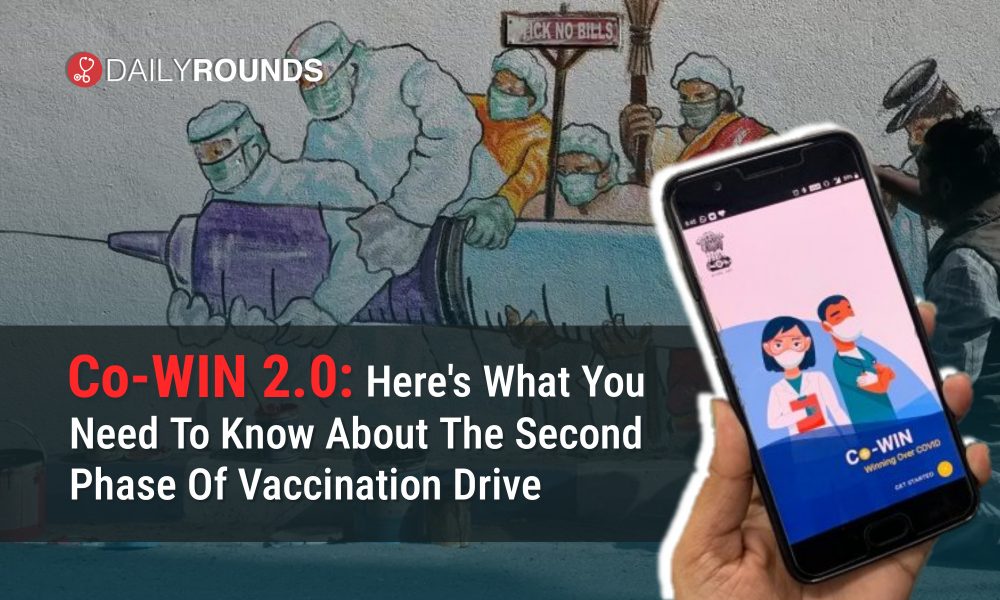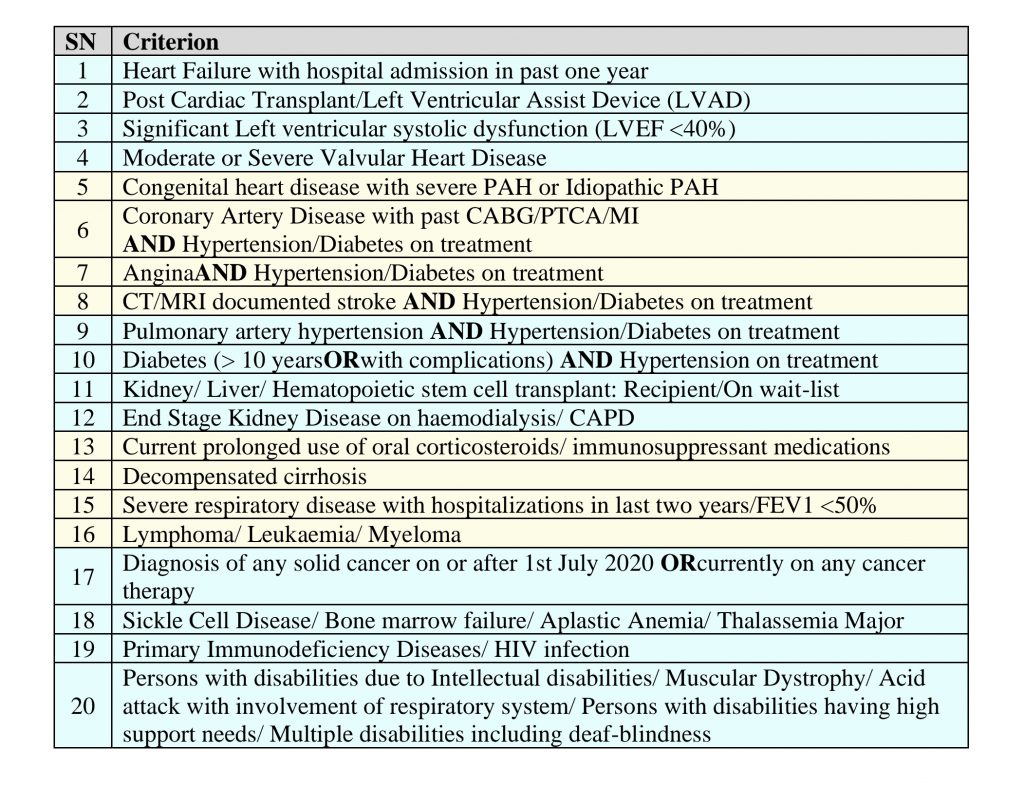
Co-WIN 2.0: Here’s What You Need To Know About The Second Phase Of Vaccination Drive
India has pushed the pedal on its Covid-19 vaccine drive. The country has begun inoculating its elderly citizens against Covid-19 in the second phase of the world’s largest vaccination drive on Monday. In this phase, people above the age of 60 years and those above 45 years who are in the high-risk category will be administered the jab.
This follows a lukewarm response to the first phase, which aimed to vaccinate 30 million health and other frontline workers but achieved less than half the number. The country targets to vaccinate 27 million people in the second phase. On the first day, 25 lakh potential beneficiaries registered on the Co-win portal and will be vaccinated in the next few days. Prime Minister Narendra Modi took the first dose of vaccine at Delhi’s All India Institute of Medical Sciences (AIIMS). The PM after taking the first dose, appealed to all those who are eligible to take the vaccine and contribute to making “India COVID-19 free!”
As India kickstarts the second phase of the world’s largest COVID-19 vaccine drive, here’s everything you need to know:
Who is eligible to get the vaccine?
People who are above the age of 60 and people within the age bracket of 45 to 59 years with specified co-morbidities are allowed to take the Covid-19 vaccine shots. All healthcare workers and frontline workers as specified by the health ministry who are yet to take the vaccine are also eligible for getting the jab on the second phase of the vaccine drive.
The government has released a list of specified comorbidities for the determination of eligibility of citizens in the age group of 45 to 59 years:

How to register?
People who are eligible and want to get vaccinated in the second phase of the Covid-19 vaccination will have to register on the Co-Win platform. Registration on Co-Win 2.0 portal – www.cowin.gov.in – opened at 9 am on Monday.
However, the Union health ministry on Monday clarified that the Co-WIN app is “only for administrators” and that people who want to book an appointment for Covid-19 vaccination should instead visit the Co-WIN website. The ministry gave the clarification amid reported glitches in doing registrations.
The website will show the government and private hospitals serving as Covid Vaccination Centres (CVCs) with the date and time of the available schedules. The beneficiary can choose the CVC of his/her choice and book an appointment for vaccination.

A beneficiary can register with his or her mobile number and in turn, will receive an OTP with which his/her account will be created. One can also get their family members registered on the account. People can also get themselves registered through the Aarogya Setu app by verifying One Time Passwords (OTPs).
People who are unable to register themselves can directly visit the vaccination center along with required documents and get themselves registered.
What are the documents required?
A government ID proof will be sufficient for people over the age of 60. However, people aged between 45 and 60 years having comorbidities will need a certificate from a registered medical practitioner — from the public or private sector — verifying that they have any of the above-mentioned comorbidities, hence eligible to get the Covid-19 vaccine on priority.
The certificate can either be uploaded on Co-Win2.0 by the beneficiary while self-registering or a hard copy can be carried by the beneficiary to the CVC.
What is the cost of vaccination?
The government facilities across the country will carry out the vaccination drive at no cost, whereas private hospitals can levy up to ₹250 per person per dose. However, some states like Bihar recently stated that vaccines will be made available for free even in private hospitals.
Where can you get vaccinated?
Vaccination will be available at all of the more than 10,000 private hospitals empanelled under PM Jan Arogya Yojana, the tertiary care arm of the government’s Ayushman Bharat scheme, and the over 600 hospitals under the Central Government Health Scheme (CGHS). Private hospitals empanelled under state schemes can function as Covid vaccination centers as well.
The list of hospitals can be accessed on the website of the Union Health and Family Welfare, where one will also find a user guide for citizen registration and appointment for vaccination.
What is the process for the second dose?
After the first dose, the beneficiary will be automatically given a scheduled appointment for the second dose at the same center. However, if the beneficiary has moved to another city, the appointment can be rescheduled at the nearest vaccination center in that city.
Must the second dose be on Day 29?
This is not mandatory. According to a guidance document given to the states, the second dose will be scheduled at the same center on Day 29; however, the beneficiary will have the option to change the slot for the second dose to any day between the 29th and 42nd days.
This option will be available on two conditions: when the first dose has already been administered, and if so, only for such centers where the vaccine type is the same as that for the first dose.
What facts must a beneficiary declare to the vaccinator?
The beneficiary should mention if she ever has had a severe allergic reaction (anaphylaxis) after any drug, food, any vaccine, or any ingredients of the Covid-19 vaccine. Second, the beneficiary has to mention if she has a fever. Most importantly, she has to mention if she has a bleeding disorder or is on a blood thinner. Fourth, she has to say if she is immunocompromised or is on a medicine that affects the immune system.
Are those on a blood thinner excluded?
No. The Health Ministry guidelines are that vaccines should be administered with caution in persons with a history of any bleeding or coagulation disorder.
Dr. Balram Bhargava, DG, Indian Council of Medical Research, had earlier explained that anti-platelets, which are aspirin or clopidogrel are not a problem at all; and anticoagulants, like heparin, which leave patients with a higher tendency to bleed. The worry is that local swelling can occur at the injection site. Anticoagulants can be stopped for two days prior to the vaccination.
Who all cannot get vaccinated?
The Health Ministry fact sheet says the vaccine cannot be given to three categories:
Persons with a history of an allergic reaction to a previous dose of Covid-19 vaccine; those with an allergic reaction to vaccines or injectable therapies, pharmaceutical products, and food items; pregnant and lactating women, and women who are not sure of their pregnancy.
In addition to this, the Centre has also specified three categories of temporary contraindications. For such people, vaccination is to be deferred for four-eight weeks after recovery. These categories are: persons having active symptoms of SARS-CoV-2 infection; Covid-19 patients who have been given anti-SARS-Cov-2 monoclonal antibodies or convalescent plasma; and acutely unwell and hospitalised — with or without intensive care — patients due to “any illness”.
Follow and connect with us on Twitter | Facebook | Instagram